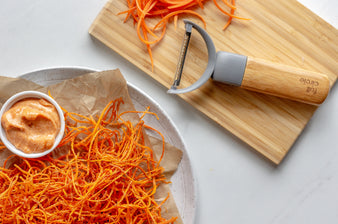Let's Talk About Cellulose
Let’s take a trip back to your middle school science class. Remember cellulose? It’s the most abundant organic polymer on this planet and it’s found in plants. In fact, it’s what keeps plant cell walls sturdy enough to withstand the elements (rain, wind, footsteps, etc.).
Plastic is another polymer—the only difference is that it’s from fossil fuels, not plants. We’ll stick with the latter, thank you.
It’s likely that you don’t see the word often, but cellulose is all around us. Cellulose fibers are those like hemp, jute, cotton, and linen. Cellulose is also what is responsible for paper.
Cellulose is in the plants we eat, too. We just know it by a different name: fiber. Humans aren’t able to digest cellulose, which is why we don’t eat grass like our cellulose-digesting animal friends (cows, horses, and sheep). But cellulose is still beneficial for us, and fiber is extremely important for our digestive system. Because we can’t digest it, it pushes food through our system and out of our body.
So what does all of this have to do with Full Circle Home? What could dietary fiber possibly have to do with safe and sustainable products for around the house?!?
Well, some of the same properties that make cellulose so helpful for our bodies and plants is why cellulose is also found in some of our products, like our In A Nutshell scrubber sponges and our Laid Back 2.0 dish sponge.
You see, cellulose is tough enough for grease and grime, but as a 100% plant-based material it’s gentle enough for our planet, too.
It works like polyurethane (plastic), but breaks down naturally. Polyurethane sponges, on the other hand, will eventually break down, but they could take up to 52,000 years to do so. The manufacturing process to make cellulose products is much less toxic, too.
Here’s another benefit of cellulose. It’s plant-based, remember? We source ours from sustainable, renewable resources (trees). When the alternative means making plastic sponges out of fossil fuels, it’s clear why you’ll see this material a lot in our product descriptions.




